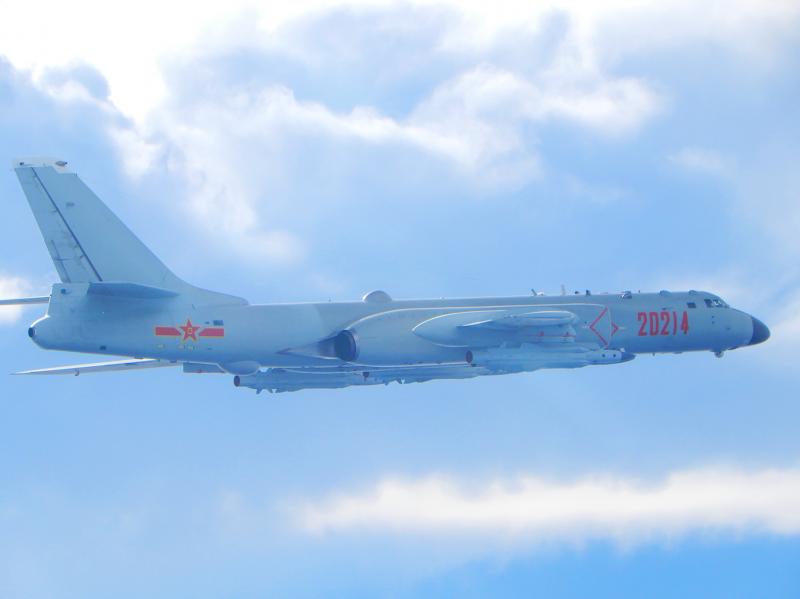The number of Chinese incursions into Taiwan’s air defense identification zone (ADIZ) last year was the highest since 1996, with the majority of them occurring in the zone’s southwest, a government-funded report has said.
Chinese military aircraft entered the nation’s ADIZ on 91 days from Jan. 1 to Nov. 30, the Institute for National Defense and Security Research said in a report on the Chinese People’s Liberation Army (PLA).
Last year also saw the highest number of long-distance training missions by the Chinese military around Taiwan, the institute said, citing just six and 20 missions in 2016 and 2017 respectively.

Photo: Reuters
During the 1995-1996 Taiwan Strait missile crisis, China conducted a series of ballistic missile tests in the waters around Taiwan in the run-up to the nation’s first direct presidential election.
Ministry of National Defense spokesman Major General Shih Shun-wen (史順文) has said that the PLA flew about 380 sorties into the southwest ADIZ last year, a trend that has not been seen in the past.
The institute, which is affiliated with the ministry, said the Chinese intrusions are connected to the frequency of US military activities in the area, and are a warning over the warming of relations between Taiwan and the US.
There could be several reasons for the increase in intrusions, one of which is that China might be testing Taiwan’s military response capabilities, as the median line of the Taiwan Strait does not extend into the southwest ADIZ.
The PLA’s actions are also an effort to increase its presence in an attempt to expand China’s sphere of influence, the institute said.
Another reason could be to intimidate the Taiwanese military and exert pressure on its defenses on the Pratas Islands (Dongsha Islands, 東沙島) in the South China Sea.
An important factor to consider is that China is using marine patrol aircraft to collect underwater and other related information in the area, which is the main passageway for vessels and submarines entering the western Pacific, it said.
The PLA is also hoping to deter Taiwanese and US submarine activity in the region, it added.
The institute said that in the long-term, the intrusions could offer Taiwan certain advantages, such as increasing the legitimacy of US sales of offensive weapons to Taiwan.

CHAOS: Iranians took to the streets playing celebratory music after reports of Khamenei’s death on Saturday, while mourners also gathered in Tehran yesterday Iranian Supreme Leader Ayatollah Ali Khamenei was killed in a major attack on Iran launched by Israel and the US, throwing the future of the Islamic republic into doubt and raising the risk of regional instability. Iranian state television and the state-run IRNA news agency announced the 86-year-old’s death early yesterday. US President Donald Trump said it gave Iranians their “greatest chance” to “take back” their country. The announcements came after a joint US and Israeli aerial bombardment that targeted Iranian military and governmental sites. Trump said the “heavy and pinpoint bombing” would continue through the week or as long

TRUST: The KMT said it respected the US’ timing and considerations, and hoped it would continue to honor its commitments to helping Taiwan bolster its defenses and deterrence US President Donald Trump is delaying a multibillion-dollar arms sale to Taiwan to ensure his visit to Beijing is successful, a New York Times report said. The weapons sales package has stalled in the US Department of State, the report said, citing US officials it did not identify. The White House has told agencies not to push forward ahead of Trump’s meeting with Chinese President Xi Jinping (習近平), it said. The two last month held a phone call to discuss trade and geopolitical flashpoints ahead of the summit. Xi raised the Taiwan issue and urged the US to handle arms sales to

State-run CPC Corp, Taiwan (CPC, 台灣中油) yesterday said that it had confirmed on Saturday night with its liquefied natural gas (LNG) and crude oil suppliers that shipments are proceeding as scheduled and that domestic supplies remain unaffected. The CPC yesterday announced the gasoline and diesel prices will rise by NT$0.2 and NT$0.4 per liter, respectively, starting Monday, citing Middle East tensions and blizzards in the eastern United States. CPC also iterated it has been reducing the proportion of crude oil imports from the Middle East and diversifying its supply sources in the past few years in response to geopolitical risks, expanding

An Emirates flight from Dubai arrived at Taiwan Taoyuan International Airport yesterday afternoon, the first service of the airline since the US and Israel launched strikes against Iran on Saturday. Flight EK366 took off from the United Arab Emirates (UAE) at 3:51am yesterday and landed at 4:02pm before taxiing to the airport’s D6 gate at Terminal 2 at 4:08pm, data from the airport and FlightAware, a global flight tracking site, showed. Of the 501 passengers on the flight, 275 were Taiwanese, including 96 group tour travelers, the data showed. Tourism Administration Deputy Director-General Huang He-ting (黃荷婷) greeted Taiwanese passengers at the airport and